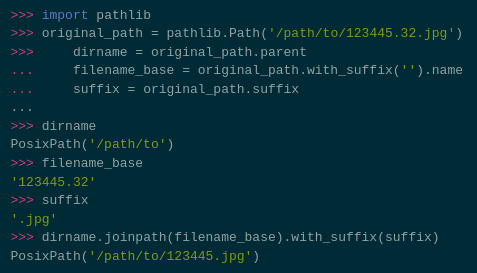ClickHouse CI · @ClickHouseCI
25 followers · 288 posts · Server hostux.social#TIL #pathlib.Path in #python can not only lead the `Path('.') / file`, bu be at any place in the expression
In [42]: 'tmp' / Path('build_report_some_name.json')
Out[42]: PosixPath('tmp/build_report_some_name.json')
In [43]: 'tmp' / Path('build_report_some_name.json') / 'some_another_part'
Out[43]: PosixPath('tmp/build_report_some_name.json/some_another_part')
C. · @cazabon
151 followers · 3456 posts · Server mindly.socialI get not liking the "clever" overloading of the division operator. Luckily, you don't have to use it - you can pass a full path as a single string, or a list of strings, and it will Do The Right Thing:
>>> Path("/usr", "lib", "grub")
PosixPath('/usr/lib/grub')
>>> Path("/usr/lib/grub")
PosixPath('/usr/lib/grub')
pathlib is nice because it gives some better, high-level abstractions. Things like `path.relative_to(other_path)` are very natural to read.
[...]
· @multimeric
359 followers · 377 posts · Server genomic.socialDay 3,406 of wishing Python's tempfile module returned pathlib.Path objects instead of str.
Edward · @cosmoscalibur
8 followers · 97 posts · Server col.socialAnubhav · @anubhav
10 followers · 342 posts · Server hachyderm.ioIn a a recent #Python (3.6) program used "#pathlib.Path" to munge paths. It was a pleasant change from the #eye_poking "str.join" and (fair) "str.split" functions.
parv · @parvXm
66 followers · 2214 posts · Server mastodon.social@brettcannon @nedbat Nice (for "[#pathlib] picking up os.walk()"), as I had wanted that in it in #python 3.{[89],10} not too long ago.
aegilops :github::microsoft: · @aegilops
46 followers · 172 posts · Server fosstodon.org@brettcannon thanks for your work on pathlib!
I used that just yesterday in a project instead of os.path.
#python #pathlib #thankadeveloper
Serge Matveenko ♻️☮️Ⓐ · @lig
198 followers · 2464 posts · Server fosstodon.orgPython Morsels 🐍🍪 · @PythonMorsels
442 followers · 385 posts · Server mastodon.socialRT @treyhunner@twitter.com
Before #pathlib
import glob
code = []
for name in glob.iglob('**/*.py', recursive=True):
with open(name) as py_f:
code.append(py_f.read())
After ✨
from pathlib import Path
code = [
http://path.read_text()
for path in Path.cwd().rglob('*.py')
]
🐦🔗: https://twitter.com/treyhunner/status/1562907453750095873
Python Morsels 🐍🍪 · @PythonMorsels
442 followers · 385 posts · Server mastodon.socialRT @treyhunner@twitter.com
Before #pathlib
import os.path
BASE_DIR = os.path.dirname(os.path.dirname(os.path.abspath(__file__)))
TEMPLATES_DIR = os.path.join(BASE_DIR, 'templates')
After ✨
from pathlib import Path
BASE_DIR = Path(__file__).resolve().parent.parent
TEMPLATES_DIR = BASE_DIR / 'templates'
🐦🔗: https://twitter.com/treyhunner/status/1560370741551456256
Trey Hunner 🐍 · @treyhunner
957 followers · 1063 posts · Server mastodon.socialBefore #pathlib
import glob
code = []
for name in glob.iglob('**/*.py', recursive=True):
with open(name) as py_f:
code.append(py_f.read())
After ✨
from pathlib import Path
code = [
http://path.read_text()
for path in Path.cwd().rglob('*.py')
]
Trey Hunner 🐍 · @treyhunner
957 followers · 1063 posts · Server mastodon.socialBefore #pathlib
import os.path
BASE_DIR = os.path.dirname(os.path.dirname(os.path.abspath(__file__)))
TEMPLATES_DIR = os.path.join(BASE_DIR, 'templates')
After ✨
from pathlib import Path
BASE_DIR = Path(__file__).resolve().parent.parent
TEMPLATES_DIR = BASE_DIR / 'templates'
Bite Code · @bitecode
121 followers · 4883 posts · Server framapiaf.orgRT @python_tip@twitter.com
#pathlib Path.stat().st_size prints size of the file in bytes
https://docs.python.org/3/library/pathlib.html#pathlib.Path.stat
🐦🔗: https://twitter.com/python_tip/status/1207578845890699264

